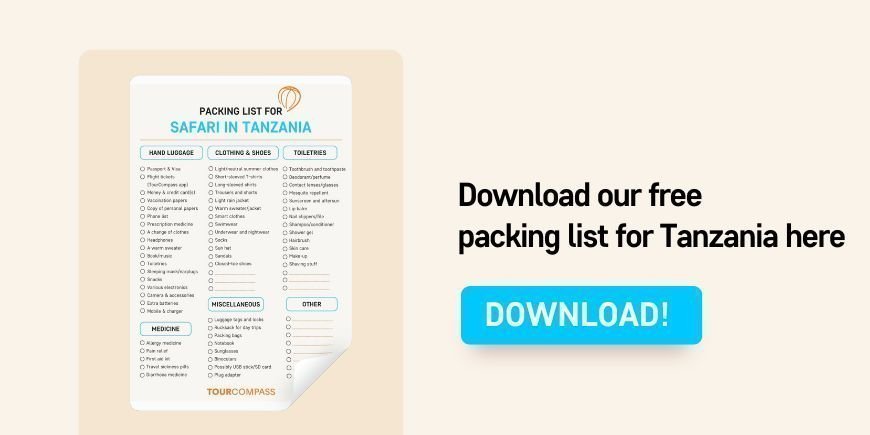- Home
-
Our tours
- Our tours
- Africa
- Asia
- Latin America
- North America
- Oceania
- Holiday types
-
Accommodation
- Accommodation
- Africa
- Asia
- Latin America
- North America
- Oceania
-
Practical info
- Practical info
- Africa
- Asia
- Latin America
- North America
- Oceania
- Info & contact
- Blog
Packing list for safari in Tanzania– including FREE PDF checklist
14.04.2024 | updated: 21.08.2024
A safari in Tanzania is a fantastic and memorable experience that offers both magnificent nature experiences and encounters with the African wildlife.
So, when preparing for your safari, it’s important to pack smartly to ensure you enjoy the adventure to the full while you’re away.
Read our tips on clothing and equipment, and get a packing list for safari in Tanzania, including a PDF packing list, ready to download.
FAQs about what to pack for Tanzania
A lot of questions can pop into your head when packing for your safari in Tanzania. What should I wear? What should I pack?
In this guide, we’ve tried to answer some of the questions we’re most frequently asked by our guests.
What is the best clothing for a safari in Tanzania?

When you travel to Tanzania, the clothes you should pack depends a lot on the season and the weather. So, always remember to check the weather forecast before packing your clothes.
Think about the following when choosing what clothes to bring for your safari in Tanzania:
Wear comfortable clothes: You often have to sit in a car for many hours, so it’s a good idea to wear comfortable cotton clothes instead of polyester.
Pack several layers: It might be sunny during the day, but the mornings can be cold in Tanzania. So, pack clothes that adapt to the changing temperatures, e.g. multiple layers and a jacket and possibly a scarf to keep you warm on a chilly morning.
Cover up after dark: Long sleeves and trousers protect you from mosquitoes after dark – and also from the sun during the day.
Pack a good sun hat: The daytime sun in Tanzania can be very harsh, so remember a good sun hat, cap or similar on your safari.
Don’t pack too much: You should always pack the essentials, but don’t pack more than you need.
What colours should I wear on safari?
There are no rules about what you should wear when going on safari in Tanzania.
However, it may be a good idea to wear neutral colours such as brown, khaki or similar earth tones. On the one hand, you’ll be more at one with nature and not attract the attention of animals, and on the other, it will also be less obvious if your clothes get dirty.
What shouldn’t you wear?
Although you can wear many colours on the savannah, there are some colours you should avoid on your safari.
We recommend that you avoid clothes in white, dark blue, black and harsh, bright colours. Tsetse flies are particularly attracted to dark blue and black. You should also avoid camouflage clothing, as it’s illegal for civilians to wear it in Tanzania.
What footwear should I bring?
When you’re off on a long day of safari, it’s just as important as the clothes to have packed some good, comfortable footwear.
On your safari, you can either wear sandals or closed-toe shoes, but we recommend that you bring at least one pair of closed-toe shoes for when it gets cold in the evening – also to protect you from mosquitoes.
Packing list for a safari in Tanzania
Download our recommended packing list for a safari in Tanzania as a PDF here.
Use this packing list to tick off your clothes and equipment when packing your bag for your safari in Tanzania. If you dream of another safari destination, check our general packing list for safari in Africa.
Please note that all use, import of plastic bags, such as those we know from supermarkets is prohibited in Tanzania, so we recommend that you use fabric bags or bags made of other waterproof material instead of plastic.
Hand luggage
It is important that you have your most essential items with you in your hand luggage. That way, you’ll have your most important things on you, and possibly also an extra set of clothes, should your luggage be delayed. Also, be aware of items that MUST be in your hand luggage, including some electronics. Check the specific rules with your airline.
- Passport (valid and with visa)
- Flight tickets (available in the TourCompass app)
- Money, credit cards and any other valuables
- Vaccination papers
- Copies of personal papers in your own and possibly your travel companion’s suitcase
This might be passports, visas, airline tickets, insurance papers, vaccination cards, driving licences, etc. - List of phone numbers to cancel lost payment cards, for example, or for contacting your insurance company, etc. (if things don’t go quite to plan)
- Vital or prescription medicines
- Sleeping mask/earplugs
- A change of clothes
- A warm sweater
- Toiletries, e.g. toothbrush and toothpaste if you’re spending the night on the plane
- Headphones
- Book, music or other entertainment for the flight
- Snacks
- Hand sanitiser
- Electronics, e.g., camera & memory cards, charger and possibly power bank, computer, etc.
Remember a bag and a cleaning kit to protect your camera from dust - Mobile phone and charger
Clothes and footwear
- Light/neutral (cotton) summer clothes for the safari trips
- Short/long sleeved T-shirts, tops, shorts and long trousers
- Slightly smarter clothes for the evenings
- Underwear and nightwear
- Cotton socks
- Windcheater or the like for chilly mornings/evenings
- Lightweight rain jacket
- Swimwear
- Sun hat with brim
- Bandana or light scarf
- Sandals
- Closed-toe shoes
- Nice shoes (optional)
Toiletries
- Toothbrush and toothpaste
- Deodorant
- Contact lenses/glasses
- Mosquito repellent (preventive and anti-itch)
- Sun cream
- Lip balm
- Nail clippers and file
- Shampoo/conditioner
- Hairbrush
- Shower gel
- Skincare
- Make-up
- Shaving stuff
Medicine
Keep all prescription medicines in their original containers in your hand luggage and be sure to pack enough for your entire tour.
- Allergy pills
- Painkillers
- First aid kit (plasters, disinfecting wipes, etc.)
- Motion sickness tablets
- Diarrhoea medicine, e.g., charcoal tablets
Travel accessories/Miscellaneous
- Luggage labels/luggage lock
- Rucksack for day trips
- Packing bags
- Notebook/Diary
- Sunglasses,
- Binoculars
- Camera, with plenty of memory cards and possibly extra battery
- Power adapter (in Tanzania, it is generally the round or square 3-pin, as in the UK)
What SHOULDN’T you pack for a safari in Tanzania?
- Drone
- Camouflage clothing (in Tanzania it’s illegal for civilians to wear camouflage clothing)
- Plastic bags (these are prohibited in Tanzania – this also applies to plastic bags from “Duty Free”)
- Hair dryer (although many camps and lodges have sockets, they are reserved for charging phones, cameras and power banks – not hair dryers, straighteners, etc.)
Tips for packing your safari luggage

Now you know what to pack, but what should you pack it in?
Here are 3 tips for packing your luggage
1) Pack in a lightweight, soft bag in durable materials
Pack your luggage in a lightweight bag made of durable materials. This could be a rucksack or a soft bag, making it is easy to carry and to make room for in the safari vehicles.
The bag can be made of waterproof material or have a protective cover to protect your belongings from unexpected rain showers or dust.
2) Check how many kilos you can bring with you
Check the maximum luggage allowance BEFORE you start packing, so you avoid extra fees for having packed too much.
It varies from airline to airline, how many kilos you are allowed to carry. You should also be aware that baggage rules for domestic flights may differ from those for international flights. Avoid bringing a trolley as hand luggage as domestic flights do not have space in the boxes above the seats.
3) Make use of your travel companion’s suitcase
If several of you are travelling together, we recommend packing in such a way that you can manage without one suitcase. This means that if one suitcase is delayed on the journey, you have a copy of your most important papers and a spare set of clothes in your travel companion’s suitcase.
Have a great trip!
TourCompass – From tourist to traveller

